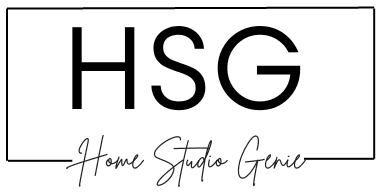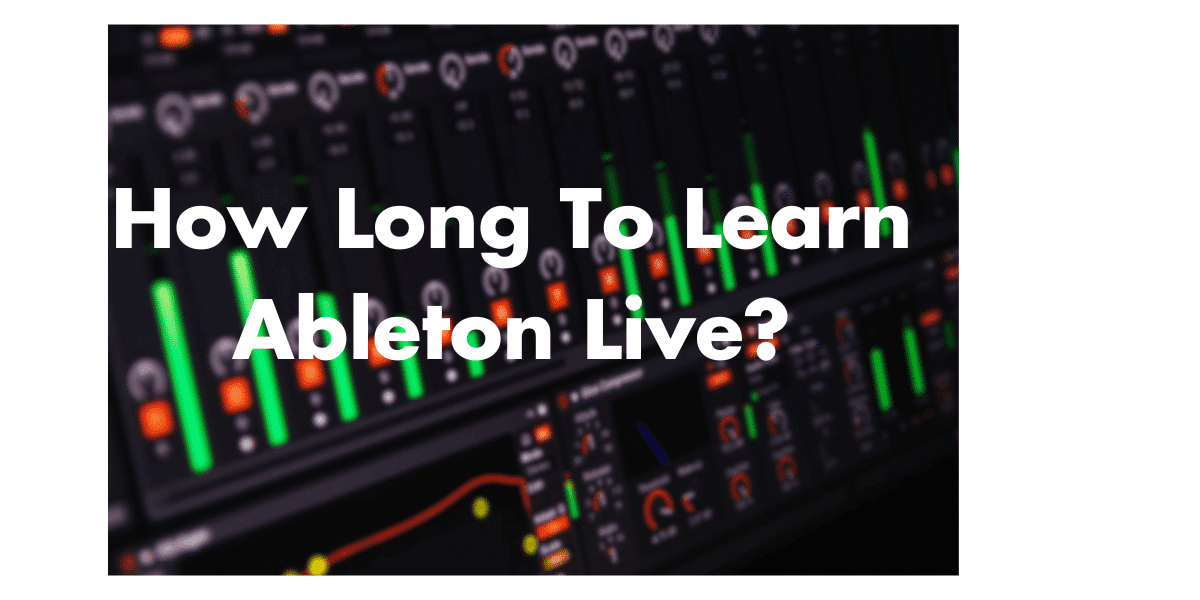It’s no secret that learning any skill takes time and patience when you’re a beginner. The same can be said for Ableton Live, which is essentially a well-known music-making software.
While it may be argued that computer software has a steep learning curve compared to other skills, you can learn pretty fast if you have the right tips and tricks.
In this article, we delve into how long it takes to learn Ableton Live and be able to make much better music in no time.
Let’s jump right into it.
Key Takeaways
- Learning Ableton Live can vary based on prior experience and dedication.
- Beginners might take a few weeks to grasp the basics, while advanced proficiency can take years.
- Using resources and structured learning paths accelerates the learning process.
- Real-life examples and testimonials can provide valuable insights and motivation.

How Long Does It Take To Learn Ableton Live?
On average, it takes about six to ten months for a beginner to learn and master the basics of Ableton Live. This means you’ll be able to work your way around the Ableton Live interface, menus, plugins, and shortcuts in less than a year.
As a beginner to Ableton Live, you’ll first need to familiarize yourself with the interface and how all the controls are set up.
Estimated Learning Duration:
| Level | Duration |
|---|---|
| Beginner | A few weeks |
| Intermediate | Several months |
| Advanced | Years |
The time it takes also depends on your prior experience with music production software.
Ableton Live can be quite intimidating when you first open up the (GUI) graphical user interface.
Even seasoned producers and music makers had some trouble when first starting out with Ableton Live. after some months of trial and error, they all wondered why they didn’t start it sooner.
Not only is it intuitive once you get to know it, but it also makes getting from idea to creation much faster. The GUI is set up in such a way that you don’t have to go too far to find what you’re looking for.
Factors Affecting How Long To Learn Ableton Live
- Practice time
- Purpose (producing, mastering, scoring, etc.)
- The genre of music produced
- Previous knowledge and experience
- The version of Live used (Ableton Live 12, 11, 10, 9, 8)
The time it takes to learn Ableton Live depends on what you’re using it for and the amount of time you put into practicing and using it. For example, a song mastering professional will likely take less time learning Ableton Live than a full-scale music producer.
This is mainly because a mastering professional does not need all the plugins, effects, and VSTs that Ableton provides. A producer might need to start song creation from scratch and as such, need most of the plugins.
Another factor is the amount of time put into practicing and actually using the program to get the hang of it. Practice makes perfect also applies to learning Ableton Live especially if you’re just starting out with it.
Other than the purpose and amount of practice time to learn Ableton, the learning time also depends on your genre of music. It makes sense that different types of genres are easier to learn than others.
Is Ableton Live Difficult To Learn?
Ableton Live is not difficult to learn if you give it enough time exclusively as your main DAW. using it exclusively allows you to make mistakes and learn much faster than if you were using it simultaneously with another DAW.

Contrary to popular belief, the 10,000 hours theory from Malcolm Gladwell need not apply when it comes to learning Ableton Live. You can get from beginner to expert with Ableton Live in a lot less time.
If you’re coming from a different DAW, the learning time can even be much shorter than expected. Most DAWS are set up in a similar layout and GUI and the terminology does not change much.
It will be a lot easier if you’ve worked with other music-making software in the past because you know the basics of computer-based music-making.
It’s much like driving an automatic car for a long time and changing to an automatic one. The basic skills and rules are there in your head, you just have to translate them differently.
One such skill to learn even faster is practicing all the keyboard shortcuts for your computer on Ableton Live. It not only speeds up production but also minimizes manual mouse inputs.
Being able to freely and quickly navigate the Ableton Live interface will enable you to concentrate on other important factors.
As with any new skill or software, in the beginning, you’ll almost always come across problems that can’t be easily solved. There are common problems with Ableton Live to look out for and solve especially if you’re just starting out with it.
That brings us to our next point
What Is The Best Way To Learn Ableton Live?
The best way to learn Ableton Live is to practice a lot but efficiently. Putting hours on end into the process does not necessarily mean you’re practicing effectively and efficiently.

This is where resources such as Ableton Live courses, YouTube channels, and networking come in handy.
Resources like these pinpoint things you should look out for when you’re just starting with Ableton.
Ableton Live videos and courses are great because they have a chronological order in which the lessons progress from beginner to expert. Most Ableton Live Courses will not start off with concepts that are difficult to grasp.
You also have the internet with resources such as Reddit and Forums. These communities are great because you come into contact with like-minded people, some of whom might also be beginners.
Important: “Most seasoned producers and artists all say that the best way to learn Ableton Live is to have a firm grasp of music theory first.”
Because Ableton is such a vast and dynamic piece of software, you’ll most likely still be learning new things about it even after a year of constant practice.
The important thing is to be consistent and have fun when learning Ableton Live.
What about Music Theory In Learning Ableton Live?
Understanding music theory can significantly enhance your ability to create music in Ableton Live.
Check out this awesome book by Anthony Allen to get you started on music theory in Ableton Live.
Knowing scales, chords, and rhythm can help you use Ableton’s MIDI tools and composition features.
Tips for Integrating Music Theory in Ableton Live:
- Learn Basic Chords and Scales: This will help you create melodies and harmonies.
- Use MIDI Effects: Ableton Live’s MIDI effects can help you apply music theory concepts.
- Practice Ear Training: This will improve your ability to identify and use different musical elements.
When I started incorporating music theory into my Ableton sessions, I noticed a huge improvement in the quality of my tracks.
It made the process of learning Ableton Live more enjoyable and rewarding.
What If I’m Learning Ableton Live All By Myself?
This will be a great time for you to experiment with Ableton Live while also learning music theory along the way. Learning the program coupled with music theory helps solidify the theory with the practice you’re putting in.
Important: “If you get lost in the program along the way, there is always the little help section at the bottom left of the screen. Hovering over this will tell you what a certain control or parameter does.”
You can also learn more quickly by messing around with the Ableton Live plugins. This is if you’re uncomfortable following a set pathway and lesson plan provided by the course and tutorials.
A quick read of the Ableton Live 12 manual is a great place to start just to get a grasp of what to expect. It’s unnecessary to memorize because you probably won’t need all of the Ableton Live features provided.
If the manual is too old school for you then a quick visit to the Ableton Live YouTube channel will help. It has great content for beginners to experts.
Real-Life Examples and Testimonials
Many producers have shared their experiences learning Ableton Live. For instance, a friend of mine, who started with zero knowledge, produced his first track within a month by following online tutorials and practicing daily.
Testimonials:
- Beginner’s Success: “I learned the basics in a few weeks by following Ableton’s built-in tutorials and YouTube videos.”
- Intermediate Journey: “After a few months of consistent practice, I started feeling comfortable with more advanced features like automation and audio effects.”
- Advanced Proficiency: “It took me a couple of years to master Ableton Live to a professional level, but the journey was worth it.”
Learning Ableton Live is a rewarding journey. You’ll find that by leveraging the right resources and dedicating time to practice, you can become proficient and enjoy the creative process.
Which Is The Best Version Of Ableton Live For Beginners?
The best version of Ableton Live for beginners is Ableton Live 12 and Ableton Live Lite. The latest version of Ableton Live is Live 12 and Ableton Live Lite is the free version.
It is recommended to start out with the free version of Ableton Live. Ableton Live Lite has the necessary plugins and support to get started.
When you’ve got a good grasp of the overall layout and the basics of Ableton, you can then choose to upgrade to Ableton Live 12. you can also try out a free trial of Ableton Live 12.

The benefit of starting with Ableton Live Lite is that you’ll be learning all the necessary skills that you’d need for a full-featured version. The skills and tricks you learn will be transferred over once you’re ready to upgrade Ableton Live.
Ableton Live editions:
- Intro: Limited, introductory features
- Standard: Full standard features
- Suite: Full standard and complete features with an extended library
The standard package is more than enough to get you from beginner to expert with Ableton Live without spending a ton of money. All these editions from Intro to Suite all work on both Windows and Apple computers.
Ableton Live 12 supports both macOS and Windows computers with certain system requirements. Ableton is great for live performances and versatile enough for studio work too!
With a few hours a week of focused practice, you’ll be ready to take on the big boys in no time.

Mike is a skilled musician, guitar technician, and music producer with a passion for audio and gear. He excels in teaching guitar, editing podcasts/videos, and creating captivating soundscapes using cutting-edge hardware, software, and plugins. Mike’s talent and commitment make him highly sought-after in the industry, inspiring fellow musicians worldwide.



